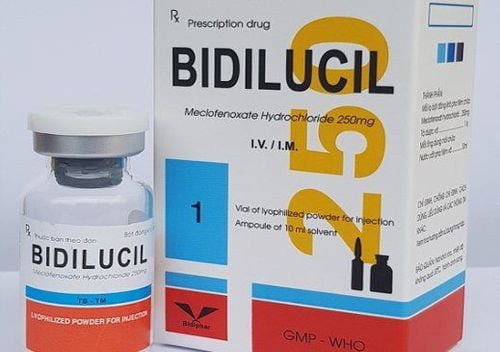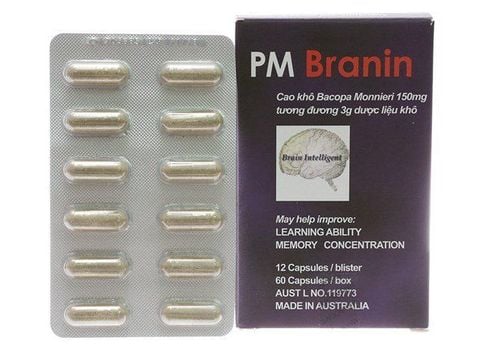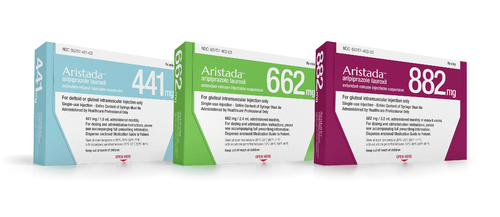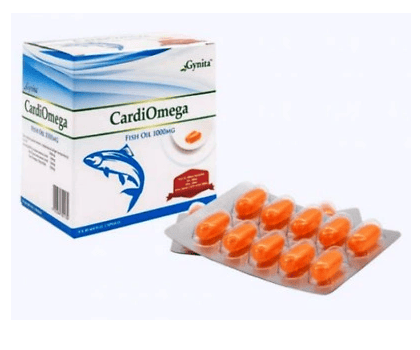This is an automatically translated article.
Apharmcetam medicine is often used to treat conditions related to the brain, such as cognitive decline, memory loss, concentration loss, ischemia,... To use Apharmcetam effectively and To be safe, patients need to strictly follow the treatment regimen recommended by the doctor.
1. What is Apharmcetam?
Apharmcetam belongs to the group of psychotropic drugs, which helps to improve memory, increase brain resistance and reduce platelet aggregation. Each box of Apharmcetam medicine includes 10 blisters x 10 tablets, each capsule contains the main active ingredient, Piracetam, 400mg content and other excipients just enough.2. Uses and indications for use of Apharmcetam
2.1 Uses of Apharmcetam The main active ingredient Piracetam in Apharmcetam medicine brings the following great uses for the brain as well as other neurological functions of the body, including:
Helps maintain and enhance the ability to function. The action of neurons thanks to direct effects on nerve mediators such as Dopamine, Noradrenaline and Acetylcholine,... Supports nerve cells to work more efficiently thanks to the ability to improve the metabolic environment , thereby helping to bring the effect of enhancing memory to the patient. The active ingredient Piracetam has the effect of enhancing the brain's resistance to people with lack of oxygen to the brain, and at the same time helping to prevent ischemic metabolic disorders. Enhances ATP synthesis in the brain by increasing non-oxygen-dependent glucose synthesis. Increases Dopamine release, thereby enhancing memory formation. Anti-platelet aggregation, while supporting the recovery of red blood cell deformation. 2.2 Indications to use Apharmcetam Currently, Apharmcetam is often prescribed by doctors to treat the following cases:
Diseases related to brain damage, patients with symptoms after brain surgery or brain injury, such as hemiplegia, psychosis, stroke, or ischemia. It is associated with peripheral and central brain disturbances, such as severe delirium, headache, or dizziness.
Illness associated with brain disorders (eg coma) or patients with symptoms of senility or impaired consciousness. Treatment of cerebrovascular accidents, intoxication as well as sequelae of carbon monoxide poisoning. Chronic neurosensory impairment and cognitive impairment in the elderly. Chronic alcoholism, dyslexia in children or myoclonus due to Parkinson's disease. Treatment of memory impairment, attention deficit or dementia in the elderly. Support the treatment of sickle cell anemia, Raynaud's syndrome or vasospasm. 2.3 Contraindication to use Apharmcetam should not be used in the following cases without a doctor's prescription:
Patients who are allergic or have a history of hypersensitivity to the active ingredient Piracetam or any of its ingredients any excipients in the drug. People with liver failure. The patient has Huntington's. Patients with severe renal impairment, with creatinine clearance less than 20ml/min. Pregnant women. Mother is breastfeeding.
3. Dosage and how to use Apharmcetam
3.1 Recommended dosage of Apharmcetam Depending on the specific health condition of the patient, the doctor will recommend different doses of Apharmcetam. Here is the dose of Apharmcetam according to the general prescription of the doctor that patients can refer to:
Usual Apharmcetam dosage: Take 30-160mg/kg body weight/day, take 2-3 times a day. Apharmcetam dosage for patients with impaired cognitive function: Take 8 tablets/day, divide the dose into 2-3 times and treat within 3 weeks. Apharmcetam dosage for the elderly with psychotic syndrome: Take 3 - 8 tablets / day. Apharmcetam dose to treat alcoholism: Take 8 tablets / day. Apharmcetam dose to treat sickle cell anemia: Oral 160mg/kg body weight/day, divided into 4 doses/day. Combined dose of Apharmcetam in the treatment of myoclonus: Take 18 tablets / day, divided into 3 times / day and each session is 3-4 days apart. 3.2 Instructions for using Apharmcetam Apharmcetam medicine is made in the form of capsules, so patients should take it orally. When taking Apharmcetam should use the same glass of water about 240ml, avoid drinking with other types of water such as milk, soft drinks or coffee. Absolutely do not split the capsule shell when taking, instead the patient should swallow the tablet whole.
3. Possible side effects when treated with Apharmcetam
During the use of Apharmcetam, patients may experience the following undesirable side effects:
Restlessness. Concerned . Easily agitated. Headache, fatigue, dizziness. Sleep disturbance, nausea, vomiting. Digestive system disorders, abdominal distension, diarrhea or abdominal pain. Drowsiness, tremors or sexual arousal. Each patient will have the risk of experiencing different side effects depending on the location. Ideally, if any symptoms occur after using Apharmcetam, the patient should quickly notify the treating doctor or go to a medical facility for timely treatment.
4. What precautions should be taken when using Apharmcetam?
Here are the important notes that patients need to know when treating with Apharmcetam:
Be careful when using Apharmcetam for patients with kidney failure because Piracetam is excreted by the kidneys. The dose should be reduced if the patient has a clearance below 60ml/min or a serum creatinine level above 1.25mcg/100ml. Elderly or epileptic patients should be closely monitored for the body's reactions during the use of Apharmcetam. Caution should be exercised when treating patients with Apharmcetam with a history of cardiovascular disease with symptoms such as hypotension or severe liver failure. You should take the drug in the correct dose recommended by your doctor, avoid taking an overdose of Apharmcetam because it can lead to a nervous breakdown. Patients with specific jobs such as operating machinery or often driving should be careful while being treated with Apharmcetam because Piracetam can cause side effects such as drowsiness, dizziness or headache. Recent research has shown that the drug Apharmcetam can bring adverse effects on the development of the fetus as well as the breastfed infant. Therefore, Apharmcetam should absolutely not be used by women who are pregnant or nursing mothers.
5. Interactions of Apharmcetam with other drugs
It is necessary to avoid using Apharmcetam at the same time as the following drugs:
Thyroid hormone stimulators when used together with Apharmcetam can cause confusion, insomnia or irritability. Avoid taking Apharmcetam with the anticoagulant Warfarin. Ideally, the patient should list a list of drugs currently using for the doctor to know for specific advice and guidance on more appropriate medication. This also helps patients avoid maximum side effects affecting health during the use of Apharmcetam.
Please dial HOTLINE for more information or register for an appointment HERE. Download MyVinmec app to make appointments faster and to manage your bookings easily.













